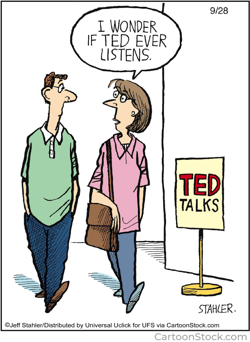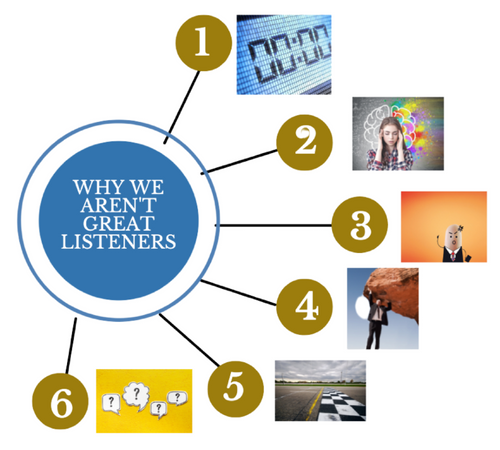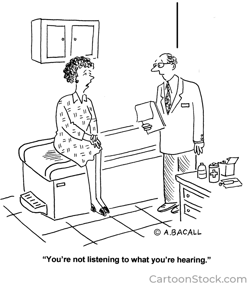Why is listening so hard?
…the real, authentic, caring, curious, change-the-world sort of listening.
Why is listening so hard? I’m not Ted like in the TV show Ted Lasso, the soccer coach. I am the Ted who is full of words, like the TED who gets to give Talks. I have learned much about the power of listening over recent years and am amazed at the power unleashed when one feels listened to. I am a verbal processor who loves thinking out loud with a patient listener. But if I’m unable to find that willing listener, I quickly get the drift and stop asking and turn to my journal (I’m on #47 now) or fill the grandchildren’s willing ears. Ahh, to be listened to! We crave to be seen, make a difference in our world, and be noticed. Being listened to is a large part of being valued as a human who has something to give.
the soccer coach. I am the Ted who is full of words, like the TED who gets to give Talks. I have learned much about the power of listening over recent years and am amazed at the power unleashed when one feels listened to. I am a verbal processor who loves thinking out loud with a patient listener. But if I’m unable to find that willing listener, I quickly get the drift and stop asking and turn to my journal (I’m on #47 now) or fill the grandchildren’s willing ears. Ahh, to be listened to! We crave to be seen, make a difference in our world, and be noticed. Being listened to is a large part of being valued as a human who has something to give.
The need for authentic and effective listening in business is not a new topic. It’s been all over the literature recently as the number one “soft skill” that can make all the difference in one’s business or organizational success. For this blog, let’s take that assumption for granted; that listening makes better teams, with greater output and creative solutions, increased success, and longer retention of employees who have the beauty of knowledge and experience (all true and more!) Then why is listening so hard? Maybe if we identify more obstacles to being better listeners, we can clear those roadblocks and become better listeners. And then maybe, just maybe, someone might learn to listen to us, too.
Over the last while, six reasons have surfaced for me explaining why generally listening is so challenging to do well in the speaker’s eyes (or, I should say, ears).
From my experience with clients and research, we aren’t great listeners because:
- We think we don’t have time.
- We suffer from information overload.
- Too many of us are still influenced by the command-and-control leadership model.
- We have an inflated sense of our importance.
- We don’t follow through with unfinished conversations.
- We think listening is an inherited human skill that we know how to do well enough, so we don’t admit/ask for help in listening.
Therefore we don’t get better at it.
 Let’s unpack these six destroyers of effective listening together.
Let’s unpack these six destroyers of effective listening together.
1. Time
We all have 24 hours a day, but we operate like we have about 12. We live trying to accomplish everything transferred from our brain to our app reminder, good ‘ole sticky notes, or to files in our minds that stick like Velcro even while we attempt to sleep. Our recent experience through the pandemic has found women working even more hours than they already did (compared to a male partner) both at home and for work. Women celebrated the ability to work remotely during Covid and didn’t want to complain about how frequently their input and responses were expected after hours since their device was right there under their noses.
2. Information overload
Even before the pandemic, our digital world had us consuming way more information than our brains knew what to do with. Recently my mother lamented how she’s the only family member who watches the local evening news on TV, worrying that we must all be knowledge deprived. My mom wasn't thinking of the endless feeds we all consume. From the LinkedIn posts and articles, the daily and evening dose of National Public Radio, the daily article pushed our way from the New York Times, Harvard Business Review, Forbes, or McKinsey, and the favorite podcasts and blogs we may follow. The newspaper yet arrives on our front stoop every morning and the sports updates are constantly on TV. And even if we think beyond work and news, there are the latest TikTok videos, Instagram, Twitter, Facebook, and text messages to view that often elicit a "Why haven't you answered me yet?" response from someone. Overload, to say the least! What is or isn’t self-imposed concerning information overload? Hmm. Is it a case of FOMO? Or are we being resourced to become better human beings to build relationships and serve our clients?
3. Command and control leadership
This leading posture doesn’t prioritize listening because it's assumed a leader knows what to do since they are in charge. Be decisive and strong! Asking for feedback makes you look weak. When you subscribe to this type of leadership, you believe you need to solely figure out what you/your organization is doing next because you’re the boss. You aren’t going to avail yourself to frequent listening sessions. When you’re a command-and-control leader, you won’t be hanging out on the work floor asking the employees furthest away on the org chart what they think could be better and what is working well. Command and control bosses walk in a room, and team members shy backward, get out of the way, and agree more than challenge what the boss man (and yes, usually bosses are men) says. Command and control leadership does not ask, it tells, and such is a sign of that leader's presumed authority and strength. This leadership model does not leave room for listening other than from who is being commanded.
4. Holding up the world
We can’t listen when we overestimate our importance or responsibility to make or break the organization’s success. This can be related to time constraints and shows up as a misplaced assumption of the role of a CEO. Yes, senior leaders set the stage for success or failure, and they can’t do the job alone. There is too much to know (think information again), and the digital world has made it all too complex for one individual to possibly be the knower, the sage in every aspect of an organization. And so, we need to stop operating as if we can’t listen for who else can take the load. We need to ask for help from other experts in this department or that field to hold the rock shelf up themselves and ideally with their whole team. Your employees need you to support them and provide what they need. They, in turn, will gather other members who can hold up different boulders while the senior leader ensures meaningful support is provided. Your employees do not want you to hold up the world. They know you can’t do it. You need them to hold up their unique parts. Listen to them declare such is true and then act on it.
5. Thinking the listening need is finished - but the speaker believes otherwise.
I’m appreciative to researchers Tiffany D. Kriz, Avraham N. Kluger & Christopher J. Lyddy for their findings highlighting the need for the speaker to determine whether true listening took place. So often, we feel the onus is on the listener to grasp our intended message. If I’ve said it and said whatever well and with as much clarity as possible, then it’s your responsibility to “get it.” But these researchers’ 2021 study reminds us that listening is determined when the speaker feels they’ve gained what they need for the topic to now be put to bed. Speakers sometimes need more listening than we can give at the moment. We too often think we’ve listened to someone but don’t realize they may need a future check-in, further information, or action taken by us to feel listened to. If we fail to note this or plan a future listening time, the speaker will end up feeling not listened to even though we may be under the assumption that the topic is done and closed.
message. If I’ve said it and said whatever well and with as much clarity as possible, then it’s your responsibility to “get it.” But these researchers’ 2021 study reminds us that listening is determined when the speaker feels they’ve gained what they need for the topic to now be put to bed. Speakers sometimes need more listening than we can give at the moment. We too often think we’ve listened to someone but don’t realize they may need a future check-in, further information, or action taken by us to feel listened to. If we fail to note this or plan a future listening time, the speaker will end up feeling not listened to even though we may be under the assumption that the topic is done and closed.
6. Not prioritizing learning about listening.
We assume we know what effective listening is all about. Lean in, look someone in the eyes and try to concentrate for at least 10 seconds while shooing away one’s distracting thoughts. By nature, we are self-preserving creatures. It’s hard to push aside self to truly and curiously desire to listen to another’s perspective. We see listening as something inbred that we’ve known how to do since we followed our parent’s early charges of do this and don’t do that. Listening is a soft skill too often on the margins of a leader’s skill sets. One can almost feel elementary seeking help learning how to listen more effectively. Growth mindsets invite learning. Effective listening requires learning for all of us. I’m not too proud to know I need and want to continue to improve my listening skills. Will you join me in learning how to be a more effective listener?
When we don’t listen well, some consequences will affect our bottom line, let alone the happiness of our team or family members. What other reasons do you find it so hard for us to listen well?
Stay tuned for my upcoming blog discussing the consequences of not listening, remedied with strategies that help the speaker feel listened to.

What I’m Reading:
Feeling Heard: Experiences of Listening (or Not) at Work by Tiffany D. Kriz, Avraham N. Kluger, and Christopher J. Lyddy -- This original research has been weighing on me lately. It describes how a speaker is the one who determines if the whether or not the listener actually listened. And this is because listening is determined based on the speaker’s need for secondary follow-up conversations and actions from the listener in the moment. (You might want to re-read that sentence.) We either easily miss this follow-up need or too readily determine it’s the listener’s fault if they didn’t grasp our intent. Imagine we believe in the power of listening for the success of our workplaces. In that case, this research article puts the onus on the speaker to ensure the listener has all they need to call the conversation closed, regardless of the speaker’s desire to engage the listener further. Impactful findings for both the workplace and home.
Schooling for Critical Consciousness: Engaging Black and Latinx Youth in Analyzing, Navigating, and Challenging Racial Injustice by Scott Seider and Daren Graves -- I took a short course this past month from Harvard Graduate School of Education called “Schooling for Critical Consciousness of Racism and Racial Injustice.” The course content stressed the unlimited agency that can be unleashed in our school’s students, teachers, and classrooms if communities allow impassioned school administrations to include recognizing oppressive forces and pursuing action steps to combat such as part and parcel of what education means.
How Company Culture Shapes Employee Motivation by Lindsay McGregor and Neel Doshi, Harvard Business Review -- I found this HBR article on what motivates a strong work culture fascinating. And this isn’t just an opinion article but a description of a research study that identified measurable direct actions that strengthened culture and what actions negatively drained culture. It's worth reading for application to your work setting. But I wonder how the flexibility aspect for workers that’s surfaced, especially through the pandemic, may add or change this list?
The Authority Gap: Why Women Are Still Taken Less Seriously than Men, and What We Can Do About It by Mary Ann Seighart -- I just received this book by UK author Mary Ann Sieghart. Yaay! I look forward to digesting more research and real-life examples of obstacles women face in the workplace due to implicit bias. I love the last phrase of the title that states, “...and what we can do about it.” The back jacket draws me in, already describing how US Supreme Court women Justices are interrupted four times more than their male colleagues by men 96% of the time. Open our ears for equity of voice!


November 10, 2022
Comments